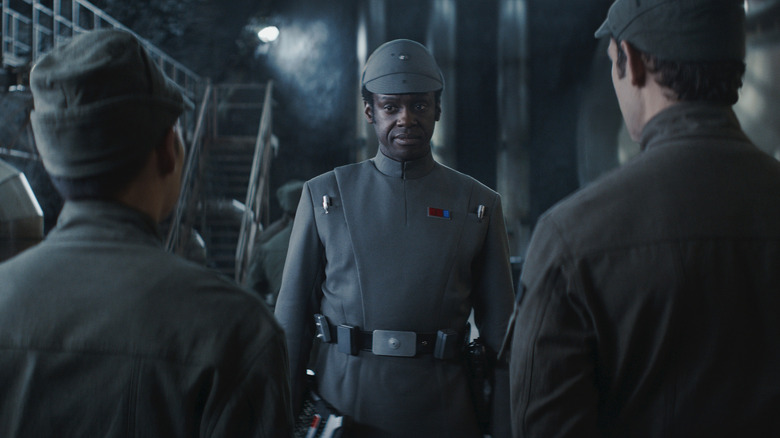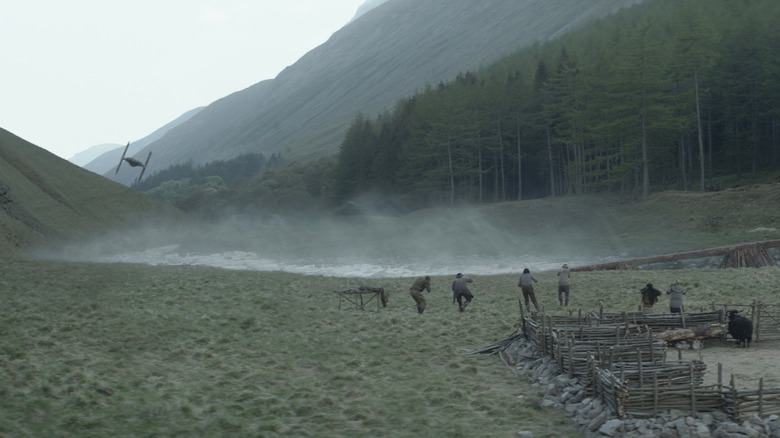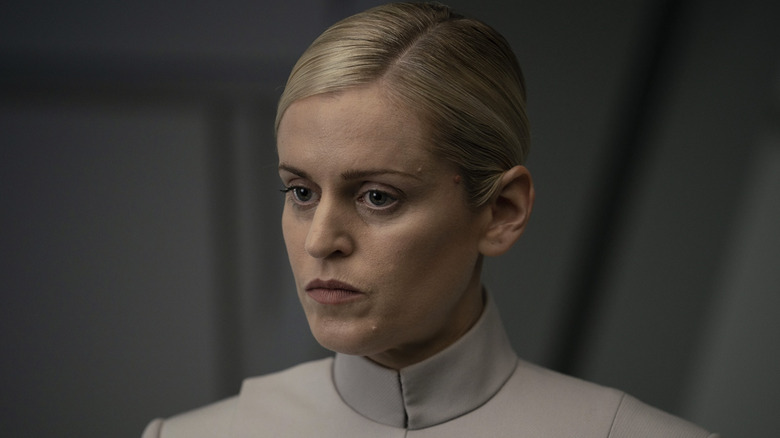The Mundane Imperial Bureaucracy In Andor Is The Most Chilling Star Wars Villain Yet
"Andor" has continued its hot streak of being the best "Star Wars" series on Disney+, and a large part of its success in creating an engaging story is its attention to the more minor details. The mainline "Star Wars" films and their grand scale work well for the theatrical experience of witnessing an epic battle of good versus evil. However, Andor succeeds in showing the smaller cogs in the machine of not only revolution but Imperial bureaucracy as well.
Throughout the first few episodes of "Andor," we've come to know the smaller unseens parts of not only the rebellion but the Empire as well. An entire side of the Empire consists of investigating, backstabbing, and ladder-climbing that feels terrifyingly real. Moreover, watching the officers investigate and slowly wrap their tendrils around Cassian Andor and his current place in a growing revolution could make viewers feel real tension with the story's progression. "Andor" makes the mundane parts of the Empire feel a lot scarier than some of the bigger shows of strength seen in previous "Star Wars" media. The inner political workings of the Empire and the different villains that come out of it also help to diversify the types of villains in the "Star Wars" universe, which keeps things refreshing.
Making the mundane scary
While "Andor" is very much a spy thriller, the series also demonstrates the dichotomy of how the rebels and the Empire function. Viewers are treated to a look at the most base forms of both forces, which also helps give the sense of the overwhelming odds the rebels are up against. Cassian and his new team of rebels are surviving on sheer will and hatred for the Empire. At the same time, the Imperial forces have a vast amount of resources and government-types thoroughly working to undermine their cause at every turn. There's no grandiose gesture of evil like blowing up a planet. Instead it's cold and calculated processes of investigation probably taken from an Imperial employee handbook.
"Andor" making the mundane scary is best encapsulated with a scene from episode 5 that depicts a single TIE fighter roaring past Cassian and the group as they prepare for their mission. TIE fighters have long been seen as cannon fodder for protagonists in "Star Wars" films, rarely seen as something to be terrified of unless displayed in large numbers. "Andor" changes that with this scene, as the roaring sound of just a single Imperial ship sends months of planning and preparation for the rebels into jeopardy. The ability the series has to make a familiar ship invoke new feelings of dread shows that good character work and world-building pay off. Furthermore, the TIE Fighter in question isn't even trying to spook rebels. Instead, he's just doing a close flyby, offering the equivalent of a cop flashing their lights just because they can.
Diverse sets of evil
Imperial security officer Dedra Meero (Denise Gough) is another excellent example of how scary the smaller parts of the Empire can be. First appearing in episode 4 of "Andor," Dedra's scenes highlighted the bureaucracy of investigating any sort of rebel activity, not to mention stifling any possible glimmer of hope following the events on Ferrix in episode 3. Characters like Dedra and Skarsgård's Luthen Rael demonstrate Tony Gilroy's solid grasp on creating political intrigue.
Another aspect that makes Dedra such a chilling antagonist is that her actions and beliefs stem from real-world social problems, solidifying the grounded tone "Andor" strives for. Many of the rebels' struggles in the series and the portrayal of the Empire thus far feel reflect current (and past) events, making "Andor" feel like more personal work. These smaller-scale characters also provide diversity in antagonists.
Not every villain in the "Star Wars" series has to be a light-saber-wielding high ranking officer of the Empire. There's a different level of authenticity that comes with watching the bureaucratic process of the Empire at work. Seeing the officers in the lower levels of the political ladder share the same dangerous beliefs as those at the top makes the mission the rebels have in "Andor" feel much more critical.


